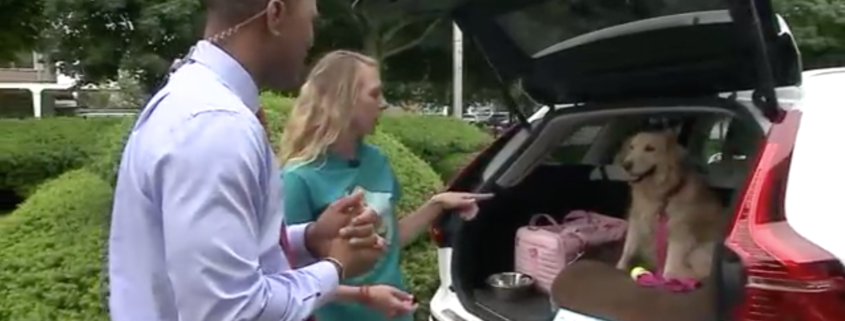WGN-TV: Road Trip Ready Pet Tips
Dr. Derse recently visited WGN-TV’s morning show to give viewers some tips on how to prepare for a road trip with pets. Here’s the full segment:
Tips for a road trip with pets
- Comfort is Key:
- When traveling with dogs, make sure they are comfortable traveling/riding in the car. Some dogs are very fearful of car rides and are therefore not good candidates for road trips.
- Seat belts: Yes or No?
- Keeping them in the back seat or back of an SUV is best.
- Small dogs can be kept in a carrier if it makes them feel comfortable and secure.
- Windows:
- You can roll down the window so they can sniff outside, but do not open it enough for them to hang their whole head/body out while you are driving.
- Keep the car a cool temperature.
- Packing List:
- Collar or harness
- Leash
- Water and food bowls
- Dog food
- First aid kit
- Blanket for them to lay on in the car
- Toy for pit stops – ball, Frisbee
- Pit Stops:
- Stop every few hours so they can go to the bathroom and offer small amounts of food and water. Dogs can get car sick just like people can, so giving them a big meal before the trip is not a good idea.
- Plan ahead to find parks or pit stops with pet-friendly areas.
- Dogs and cats can get “car sick” just like people! They may vomit, drool or pant excessively. There are several medications to help prevent motion sickness and to calm anxious pets. Since all pets respond differently to road trips, it’s best to discuss a medication plan with your veterinarian, and try it out before you make your big trip.
- It is also important to not feed your pet a large meal or big bowl of water prior to or during the trip. Large amounts of either can perpetuate motion sickness. Small amounts of food and water are best beforehand and at rest stops.
- Kids & Pets:
- Make sure the kids and the dogs are separated. Dogs should not be sitting on kids laps or jumping over the seats.
- Vaccinations, etc.:
- Your dog should always be up to date on vaccinations, heart worm preventative and flea and tick medication. However, different parts of the country have specific diseases. It is best to talk to your veterinarian about any trips you are planning with your pets so they can educate you on regional diseases and prevention.
- Leave Cats at Home:
- Cats typically do not enjoy car rides. Many cats will cry/meow the entire time they are in the car. Of course, there are always exceptions.
- If you must do so, keep them in a carrier and do not allow them to roam around the car. This can be dangerous for both the cat and the driver.


